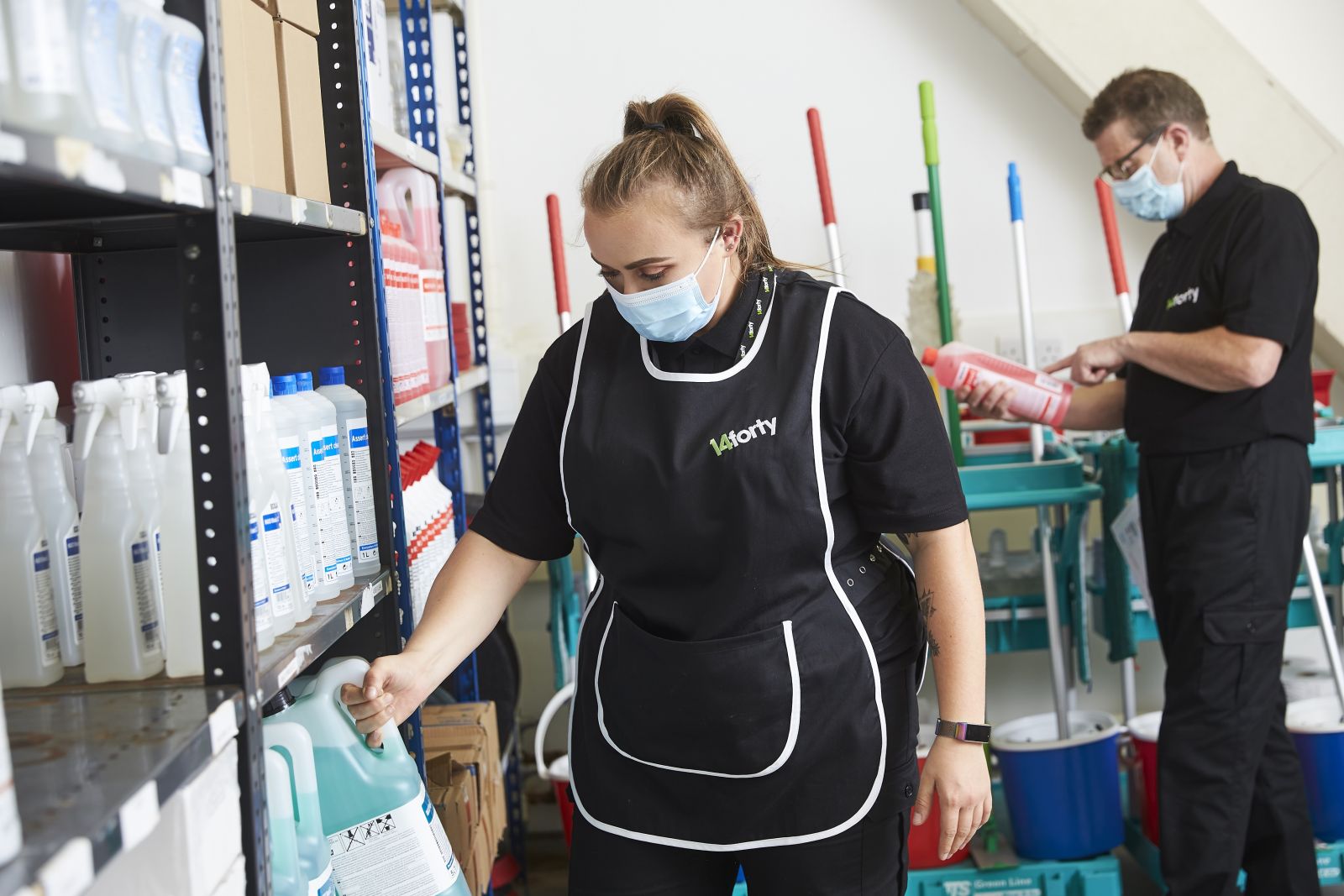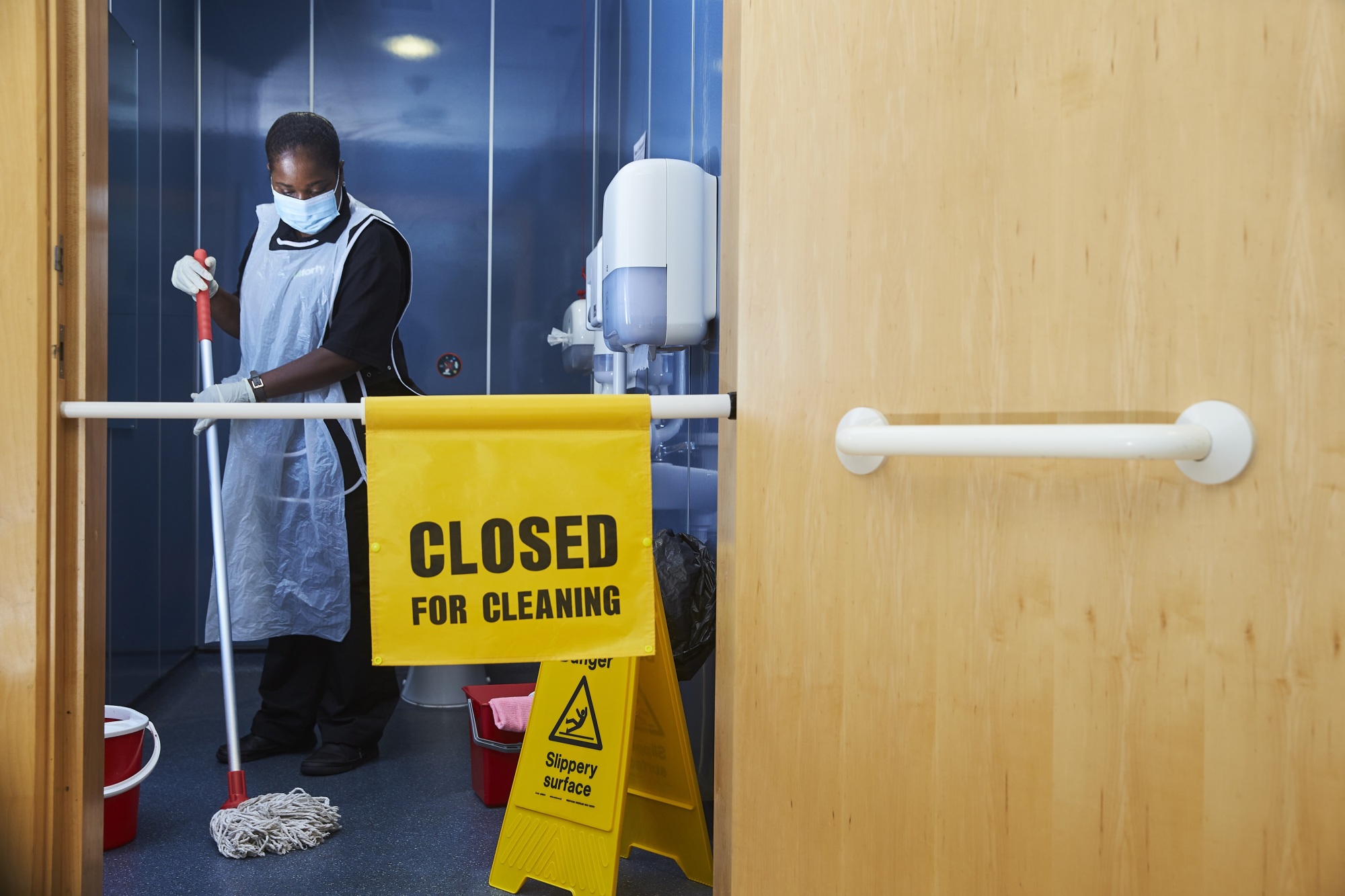13 October 2020
As the government changes its advice to “work from home if you can” amidst a national increase in coronavirus cases, good hygiene in the workplace has never mattered more, especially to keep the virus at bay and protect those keyworkers who need to be in the workplace.
14forty, part of Compass Group UK & Ireland, provides integrated facilities management services including cleaning. It is working with businesses to ensure their cleaning protocols are sufficiently robust, especially with winter looming. Based in Birmingham, the company has a turnover of £110m, employs over 3,000 people and works extensively in the oil and gas, professional services, manufacturing and financial services sectors.
Mauro Ortelli, Managing Director of 14forty, said: “There has never been more focus than now on cleaning. Implementing increased cleaning protocols during a pandemic can present wide-ranging challenges for businesses of all kinds, in some instances without the correct resources and tools to ensure an area is cleaned to the highest standards possible.
“This is a standard of cleanliness that most businesses will never have had to adhere to before. However, it’s crucial that they put in place the most robust processes possible in order to safely operate in compliance with guidance from the Department of Health and Social Care and Public Health England.”
Here are 14forty’s top five tips for businesses faced with the daunting task of becoming and staying COVID-19 secure:
1. Consider new Ways of Working
Before considering how a space is cleaned, first think about how it is used. Think about which spaces in the business have the most foot traffic and be creative in reimagining how they can be used in order to distribute people evenly, reducing the risk presented by clusters of employees.
Consider implementing a one-way system to help employees and visitors adhere to social distancing. Ensure this is easy to navigate and clearly signposted. Keep the windows open if possible and check there is a well-maintained air extraction system.
2. Use Appropriate Cleaning Products
Using suitable products and making sure staff know how to use them is vital. One example is Tersano Ozone, which 14forty uses across their sites.
The product attracts bacteria, germs and other contaminants, eliminating them and leaving only water and pure oxygen following the cleaning process. It is a natural product that is considered environmentally friendly and can be used on a wide range of surfaces including food preparation areas.

Picture: a photograph of two cleaning operatives selecting cleaning products from some shelves
3. Update and Review Cleaning Procedures Regularly
Divide surfaces into two categories: frequently touched points (e.g. rails, door handles, light switches, tabletops etc.) and minimally touched points (e.g. ceilings, floors and walls). Ensure these are cleaned regularly in line with use, i.e. the more frequently they are touched the more frequently they are cleaned.
Ensure surfaces are cleaned using the appropriate products and in accordance with manufacturer guidelines. Keep a record of all instances of cleaning and who is accountable – there are apps that can help with this.
Consider deep cleaning offices or other premises regularly using third party professional contractors. Every building is different, but a deep clean should consist of everything from dusting walls and cleaning light switches to wiping down equipment and sanitising kitchen cabinets, appliances and furniture.
4. Ensure Cleaning Staff are Visible and Equipped With PPE
Cleaners and the general workforce used to be like ships in the night, with only the early birds and night owls ever seeing cleaners in their workplace. Now, visible cleaning teams help to reassure employees and visitors to the building that cleaning is taking place throughout the day, not just when everyone else has left. Equipping cleaning staff with PPE and ensuring they are using it is fundamental to keep all staff safe and reassured.
5. Ensure Changes are Long-Term, not Temporary
Unfortunately, COVID-19 is likely to continue to impact businesses in the coming months and even years. Therefore, ensure that all changes made are long-term, while easily adaptable to account for changing COVID-19 regulations, government guidance and recommended cleaning procedures.
Businesses are keen to protect employees who need to visit the premises to do their job – it is of utmost importance. A COVID-19 outbreak in a business that failed to put proper cleaning protocols in place or appoint an appropriate service provider could have serious consequences.
Picture: a photograph of a cleaning operative working in a large accessible bathroom
Article written by Ella Tansley | Published 13 October 2020
Share
Related Articles
ALFA Eco Tech Launches “Mechanical Solution” to Virus Transmission
CoviX101 is a non-toxic product that claims to use molecular nano spikes to kill microorganisms.
Developed by ALFA Eco Tech, when CoviX101 is applied to a surface it...
Read Full Article
Ten Security Tips to Protect Vacant Buildings During Lockdown
With many employees still working from home in 2021, security experts are urging facilities managers to ensure that vacant buildings are kept safe and secure in the wake...
Read Full Article
Are Offices a Greater COVID Risk Than Supermarkets and Restaurants?
Data from Public Health England suggests that office environments have had more COVID outbreaks than other workplaces.
Figures obtained by the BBC 5 Live...
Read Full Article
Controlling Infection on Touchpoints With Antimicrobial Technology
As a direct result of the COVID-19 pandemic, keeping touchpoints in any building clean and safe has taken on an urgent significance in 2020.
Despite UK...
Read Full Article
BICSc Releases Long-Awaited Industry Standards and Best Practice Guidelines
The British Institute of Cleaning Science has released the much-needed industry publication: “BICSc Standards & Best Practice.”
At a time where...
Read Full Article
NHS Trials “Unique” New Decontamination Tech to Reduce COVID Transmission Indoors
The NHS is trialling a new technology solution which claims to replicate the science of outdoor air in indoor spaces.
Airora Professional, developed by PA Consulting...
Read Full Article
Italian Airport First in the World to Receive COVID Five-Star Rating
Rome Fiumicino Airport is the first airport in the world to be certified with the COVID-19 Five-Star Airport Rating, by international air transport rating agency...
Read Full Article
Haz-Mat Suits in Cleaning – Due Diligence or Scaremongering?
The image of cleaning operatives in full hazardous material whole-body PPE has become a familiar one in 2020 - but are there occasions where we should question its...
Read Full Article
ABM Forms Expert Advisory Council to Support COVID Response
ABM has established an Expert Advisory Council, composed of external leading experts in infectious disease and industrial hygiene.
The advisory board will...
Read Full Article
Cleaning and Hygiene – Is it now Everyone's Responsibility?
The British Institute of Cleaning Science and Kimberly-Clark Professional are calling for robust hygiene training for all staff, not just the cleaning...
Read Full Article

.gif)
.gif)
.gif)









.png)

.png)
